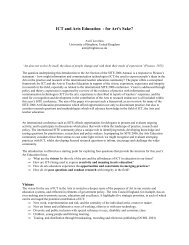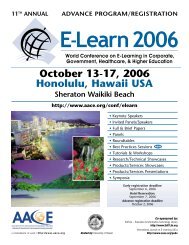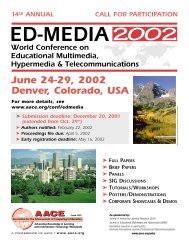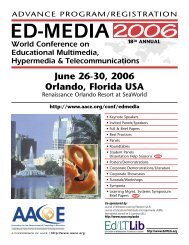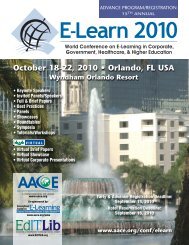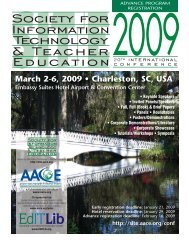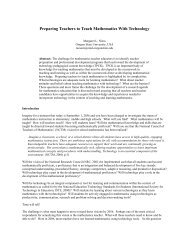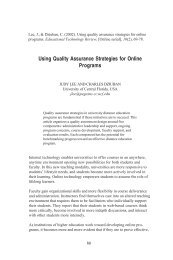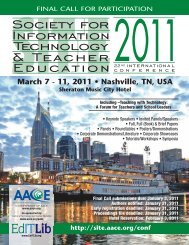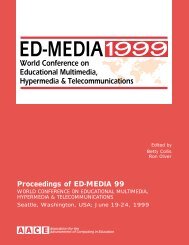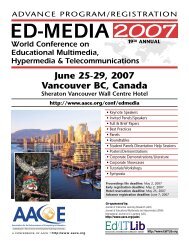ED-MEDIA 1999 Proceedings Book - Association for the ...
ED-MEDIA 1999 Proceedings Book - Association for the ...
ED-MEDIA 1999 Proceedings Book - Association for the ...
You also want an ePaper? Increase the reach of your titles
YUMPU automatically turns print PDFs into web optimized ePapers that Google loves.
International Collaborative Learning – The Facilitation Process<br />
A.G. (Tony) Clear<br />
Academic Leader, Computing - Systems & Technology<br />
Auckland Institute of Technology<br />
New Zealand.<br />
Tony.Clear@ait.ac.nz<br />
Abstract: International collaborative learning is becoming more viable through a variety of Internet enabled software products. Group<br />
Support Systems appear to offer promise. But how to facilitate <strong>the</strong> teaching and learning process in electronic environments is not well<br />
understood. If education is to involve an interactive process of collaborative inquiry and dialogue between remote groups of learners, <strong>the</strong>n<br />
how to design meaningful learning experiences presents challenges in logistics, technology support, software design, and pedagogy. To better<br />
model <strong>the</strong> facilitation process in such environments, a <strong>the</strong>oretical framework based upon an extension of Adaptive Structuration Theory is<br />
suggested. This framework is <strong>the</strong>n related to experiences with custom application software development using Lotus Notes Domino,<br />
internal trials and a limited scale collaborative learning exercise between students at Auckland Institute of Technology and Uppsala<br />
University. The paper concludes with some recommendations <strong>for</strong> redesign of <strong>the</strong> application, suggests revisions to <strong>the</strong> collaborative process<br />
based upon <strong>the</strong> framework above and discusses fur<strong>the</strong>r extensions to <strong>the</strong> trials<br />
Introduction<br />
Numerous teaching and learning initiatives, frequently cited in conferences such as this, now include an Internet dimension. Different products such as<br />
<strong>the</strong> common “chat”, “email”, and “newsgroups”, are being used to support collaborative learning (Siviter, Petre & Klein, 1997). In <strong>the</strong> business<br />
environment, organisations seeking to link disparate global teams are increasingly using groupware products such as Lotus Notes (Lloyd &<br />
Whitehead 1996), and this <strong>for</strong>m of product appears to have much to offer to support collaborative learning processes (Galpin & Birchall 1996). In this<br />
paper when talking of collaborative learning, <strong>the</strong> term is being used in <strong>the</strong> sense suggested by Siviter, Petre & Klein, 1997. They place it in <strong>the</strong><br />
context of “groupwork”, broken down into three interrelated components of “communication, collaboration and coordination”. These activities in turn<br />
may be supported by groupware – a term “adopted to describe systems that support groupwork” (Siviter, Petre & Klein, 1997). “Groupware<br />
technologies provide electronic networks that support communication, collaboration and coordination through facilities such as in<strong>for</strong>mation exchange,<br />
shared repositories, discussion <strong>for</strong>ums and messaging. Such technologies are typically designed with an open architecture that is adaptable by end<br />
users allowing <strong>the</strong>m to customize existing features and create new applications”. (Orlikowski & Hofman, 1997) The Lotus Notes Domino<br />
application discussed in this paper can be categorised as an example of an open ended customizable groupware product, and of different time, different<br />
place groupware.<br />
Group Support Systems (GSS) is an alternative term <strong>for</strong> groupware. Previously termed Group Decision Support Systems (GDSS), which covered<br />
particularly that class of systems known as electronic meeting systems, <strong>the</strong> GDSS research generated <strong>the</strong> Adaptive Structuration Theory model<br />
(DeSanctis & Poole, 1994) discussed in this paper. Group Support Systems has been suggested as a generic term <strong>for</strong> <strong>the</strong> field (Nunamaker et al.,<br />
1989), and defined by Whitworth (1997) as:<br />
"GSS: any system which supports a group interaction by becoming an integral part of that interaction"<br />
In this paper <strong>the</strong> terms GSS and groupware will be used somewhat interchangeably.<br />
Facilitation and Group Support Systems<br />
The Group Support Systems (GSS) field has turned its focus from more technocentric aspects, to broader study of how effective <strong>the</strong> technology is in<br />
use. Dennis and Gallupe (1993) have identified five stages of GSS research, which evidence this trend. Stage four covered field studies of <strong>the</strong><br />
organisational impact of GSS, and stage five an in depth focus on specific aspects - one of which is <strong>the</strong> role of <strong>the</strong> facilitator. A fur<strong>the</strong>r stage seems<br />
to be evolving, which focuses on organizational issues associated with <strong>the</strong> mutual influence of technology and social processes. This stage<br />
represents an extension from stage four’s focus on <strong>the</strong> more deterministic organizational impact of GDSS. A research approach based upon <strong>the</strong> study<br />
of <strong>the</strong>se interaction effects seems particularly suited to investigating <strong>the</strong> role of <strong>the</strong> facilitator in conjunction with GSS.<br />
It is apparent <strong>for</strong> instance, that <strong>the</strong> complexities of GSS use in <strong>the</strong> Electronic Meeting Support context, cannot sensibly be understood without inquiry<br />
into <strong>the</strong> interaction effects between dimensions of <strong>the</strong> group and <strong>the</strong> group process, <strong>the</strong> skills of <strong>the</strong> facilitator and <strong>the</strong> technology. Likewise in<br />
asynchronous groupware contexts an analysis of interaction effects may prove a productive approach to understanding <strong>the</strong> complexities of groupwork<br />
in <strong>the</strong>se distributed electronic environments. It has been suggested that “organizations need <strong>the</strong> experience of using groupware technologies in<br />
particular ways and in particular contexts to better understand how <strong>the</strong>y may be most useful in practice”. (Orlikowski & Hofman, 1997)<br />
This paper discusses a general framework <strong>for</strong> analysing technology facilitation roles. It is shown how this model might be applied to <strong>the</strong> facilitator<br />
role and provide a basis <strong>for</strong> an “interactionist” model <strong>for</strong> GSS’s, which may be extended to improve our understanding of <strong>the</strong> processes involved in<br />
electronic collaborative learning.<br />
Structuring Processes and In<strong>for</strong>mation Technology



